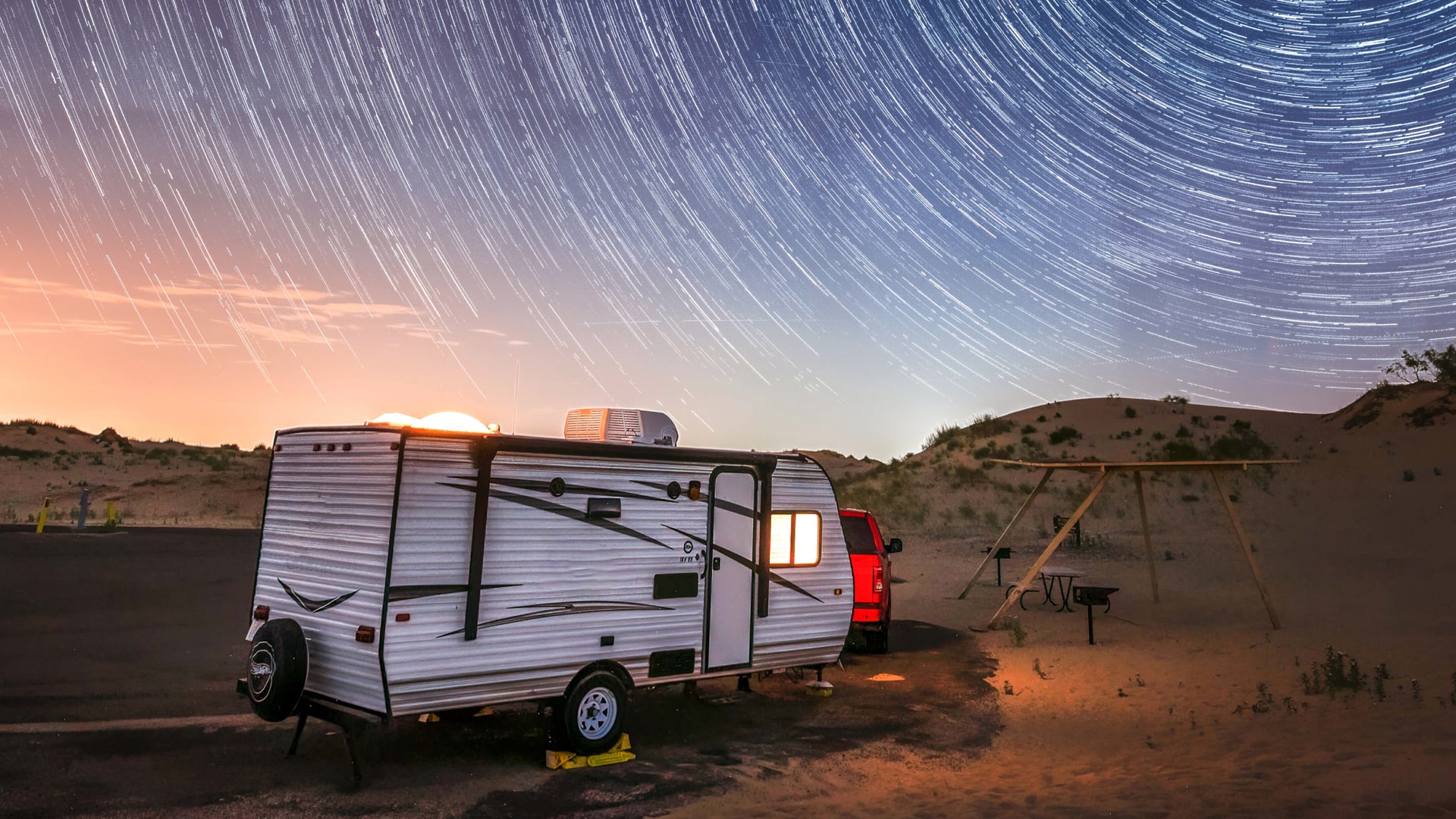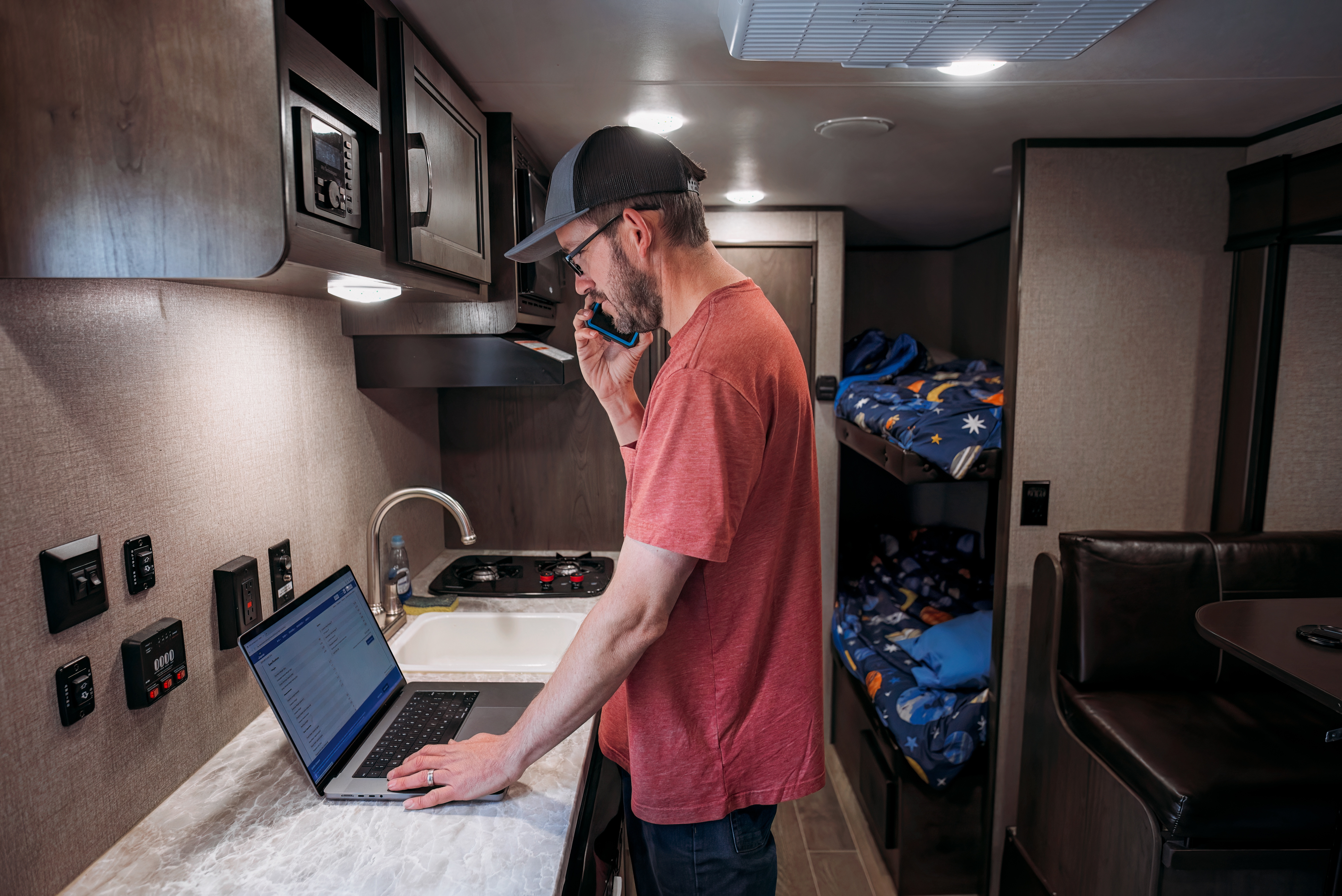
RV Buying
The Best RV Apps for Trip Planning and More
Technology has made RV travel easier than ever. Whether you’re hitting the road for a weekend getaway or planning a cross-country adventure, the right RV apps can help with trip planning, navigation and finding campsites. Instead of relying on standard GPS tools or campground directories, RV-specific apps offer routes customized for your RV height, length and weight specialized RV park database searches and even real-time traffic updates. This guide covers the best apps for RV travelers, from trip planners to internet connectivity tools.

Best GPS Apps Specifically for RVers
Not all GPS apps are built for RVs. Using an app that’s customized for your RV height, length and weight is critical for avoiding low bridges, tight turns and weight-restricted roads.
Top Picks
- RV Life GPS & Trip Wizard: A must-have for RV travelers, this app provides turn-by-turn navigation based on your RV’s exact dimensions. It also syncs with Trip Wizard, a leading trip planner for route optimization and campground stops.
- CoPilot GPS: Designed specifically for RVers, this app offers offline maps, safe routing and trip customization

Best Apps for Finding Campsites & RV Resorts
Whether you prefer boondocking, campgrounds or full-hookup RV resorts, there’s an app that simplifies finding campsites.
Top Picks
- Campendium: One of the best specialized RV park database apps, featuring user reviews, site photos and pricing details.
- The Dyrt: A great resource for national parks, state parks and private campgrounds with filters for amenities and accessibility.
- Good Sam Camping App: Helps locate Good Sam-affiliated parks and applies member discounts for overnight stays.
Best for Power, Towing & Full-Time Potential
The Super C motorhome represents the ultimate fusion of Class C convenience and Class A power. These formidable vehicles are constructed on heavy-duty truck chassis, such as the Freightliner® S2RV or Ford® F550/F600, providing immense towing capacity—up to 20,000 pounds on select models—for hauling a car, boat or a large toy hauler trailer. The target audience for a Super C is the traveler who refuses to compromise: full-timers who demand residential living on the road, equestrians traveling to shows, motorsports enthusiasts with trailers full of gear or any RVer who requires maximum power, storage and comfort.
Entegra Coach Accolade XT & Esteem XL
Profile: These models are the rugged and powerful entry point into the Super C world, built on the formidable Ford® F-Series 4x4 chassis. They are designed for adventurers who need more power and capability than a traditional Class C can offer.
Key Features: The primary differentiator is the standard 4x4 capability, which offers confident access to more remote trailheads, campsites and destinations that would be inaccessible to other motorhomes. These models feature increased ground clearance, rugged exterior appointments like custom front bumpers and substantial towing power that effectively bridges the gap between traditional Class Cs and their larger, commercial-grade siblings.
Entegra Coach Accolade
Profile: As the cornerstone Super Cs, the Accolade is built on the commercial-grade Freightliner® S2RV chassis. They are the workhorses of luxury travel, designed for serious, long-distance journeys.
Key Features: The Freightliner® S2RV chassis is the star of the show, delivering a powerful Cummins diesel engine and a massive towing capacity that inspires confidence on any terrain. These models are engineered for extended living, featuring expansive pass-through basement storage, large fresh and waste water tank capacities and residential-sized appliances, making them ideal for long-term travelers or full-timers.
Jayco Seneca Prestige
Profile: These models represent the absolute peak of Super C luxury, offering features and comfort that compete directly with high-end Class A diesel pushers. They are true residential motorhomes for those who demand the absolute best in both power and opulence.
Key Features: The list of amenities is extensive and includes all-electric coach options with powerful inverter systems, an Aqua-Hot® hydronic heating system for continuous hot water and quiet, even heating and hand-laid heated porcelain tile floors. The exterior is adorned with premium Girard® awnings, while the interior features custom-crafted hardwood cabinetry and a selection of high-end décor options. This is not just an RV; it's a luxury homes on wheels.
Loading...
Best Apps for Internet Speeds & Connectivity
Staying connected on the road is essential, whether you’re working remotely or streaming entertainment. These apps help with internet speeds, Wi-Fi access and mobile data usage.
Top Picks
- Speedtest by Ookla: A quick way to check internet speeds before settling into a campsite.
- WiFi Map: Helps locate nearby free Wi-Fi hotspots while traveling.
- Starlink App: For those using satellite internet, this app ensures the best positioning for maximum connectivity.
